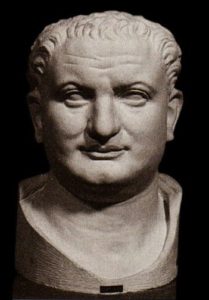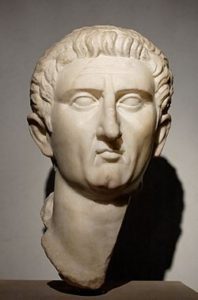Below is a detailed article about the different Flavian rulers in Britain that ruled during the Roman rule of England.
Who were the Flavian Dynasty emperors in Britain?
Contents
The Flavian dynasty ruled the Roman Empire between AD 69 and 96, encompassing the reigns of Vespasian (69–79) who founded the Flavian dynasty, and his two sons Titus (79–81) and Domitian (81–96).
How long did it last?
It lasted for 27 years between AD 69 and 96.
Emperor Vespasian
His original name was Titus Flavius Vespasianus. He was born in 9 AD and was the founder of the Flavian dynasty. He was highly known for bringing in political stability in the Roman Empire across the world. He reigned from 69 AD following the death of former emperor Nero until 79 AD.

He had a vast Roman building program which he is widely known for. His father was a tax collector and a Roman knight. He gave many years in military service of the Roman army in Thrace and Crete in Greece. He was the commander of Legio II in Augusta and was a part of the conquest of Britain that was led by Claudius. He invaded the Isle of Wight and conquered many tribes therefor which he was awarded by the Roman government.
Later, in 63 AD, he was given the consulate of Africa where the people were against his financial rigor. He then participated in the Jewish rebellion and was in charge of three big legions. He and his army won over almost all of Judaea but stopped the fight after the death of Nero.
He had a son named Titus who was also quite active in military matters and a man of war just like his father. In the year 69 AD, after the death of, the Senate confirmed him as the new emperor of the Roman empire on account of his service and valor. He was even given a number of new privileges that the Julio Claudian Empire was incapable of. He was particular of his courts and devised an extra-legal authority for them.
He is also known for building up titles surrounding his name and for holding the consulate from time to time. He promoted financial programs throughout his reign and claimed public land in Italy. His aim was to increase revenue by 3 times which according to his calculations was much needed in the Roman Empire. He was the one to raise the funds to build the Colosseum and the Temple of Peace.
In Britain, he improved the frontiers, safeguarding the Romano British territory from the south Germans. He conquered over Wales and in Britain gained control in Briganta over the Brigantus tribe. He also devised a governorship in the Scottish highlands.
When he was 69 years old and still an emperor in 79 AD, he died of natural causes. His son Titus succeeded him and reigned for the next 2 years.
Emperor Domitian
Domitian was the son of Emperor Vespasian and the brother of Emperor Titan who he succeeded as King. Domitian was not as a military man as his father and brother but was known for his strategic thinking and public welfare. He was born in 51 CE and was the youngest son of Vespasian. Unlike his brother, he spent most of his youth in poverty as he was not born as a prince or an inheritor of the throne of the Roman Emperor.

While his brother and father were at the battlefield, he was in Rome and exalted as a representative of the Flavian family. He took administrative decisions on behalf of his father. After his fathers return he was given little responsibility but had all the titles of honor. This was not an effective preparation for the future emperor. In 81 AD, he attained the throne after the death of his brother out of natural causes.
There were many rumors of Domitian poisoning his brother or being responsible for the death of Titus but nothing as such could be proved. He married a woman named Domitia. Domitian was not popular in a good way. There were many critics in the kingdom on his views. He was an able administrator and sought people’s welfare. He built a huge hall for musicians and poets. He also built stadiums and a temple – Jupiter the Guardian. He built a new Flavian palace and the Domus Augustana.
He abolished homosexuality and executed the senators that practiced it. He was known to be just, generous and considerate. He continued the construction of the Colosseum and founded music festivals that occurred there. He encouraged sports and gymnastics. He would plan military expeditions for the Roman army and is known for a victorious Germanic campaign in 83 AD.
He was an able emperor and titled himself ‘dominus et deus’ which is master or god. He had the pride of being the best and was jealous of governors that would do better than him. He, therefore, executed Lucullus – governor of Britannia or the Roman Britain territory. The reason being he became too popular. He appointed Agricola to be the new Roman Britain general.
He also appointed ‘informers’ that would basically give him all the gossip that would take place among the military generals. He would learn about any plots or rebels planned against and execute the suspects.
His death was a planned conspiracy of his staff. One night, one of the members Stemphanus pulled out a dagger and stabbed him. His wife approved the conspiracy. He was only 44 years old when he died. His ashes were taken by his nurse and put in the Temple of Flavian.
The Flavian dynasty of Roman Rulers ended with him.
Flavian dynasty and Christianity
Christianity existed since the reign of Tiberius, around 30 A.D. when Jesus was crucified. The Flavian dynasty got power only after the death of Nero and the year of four emperor’s in which the fourth emperor, Vespasian emerged victorious. So Christianity wasn’t officially legal as a religion until the reign of Constantine I.
